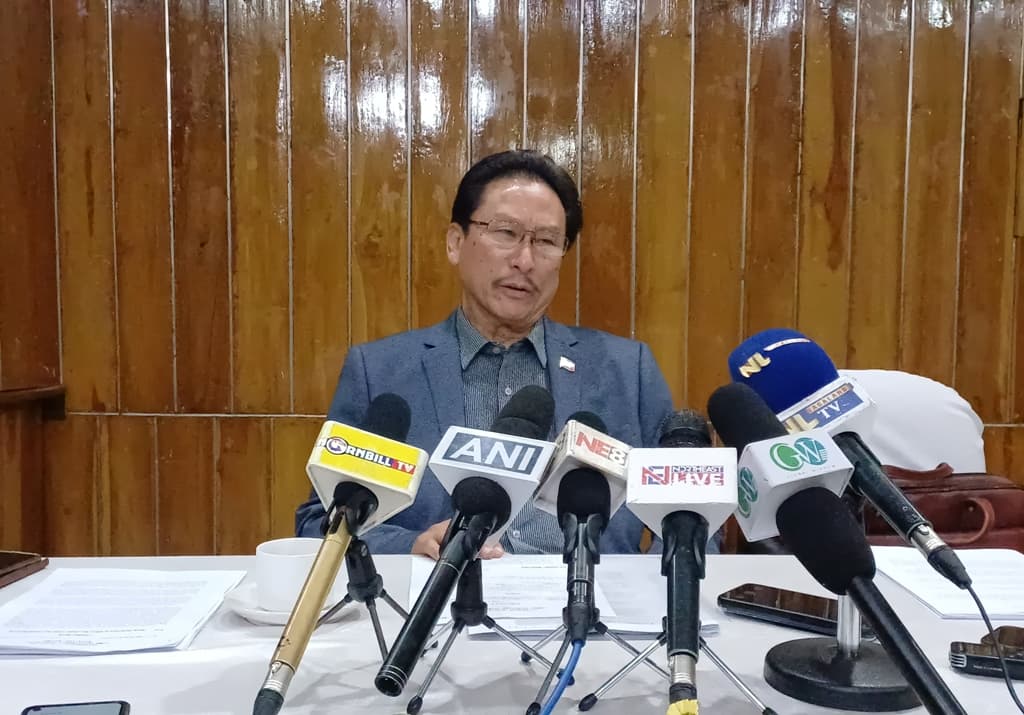THURSDAY, OCTOBER 30, 2025
- Home
- KG Kenye urges understanding on Frontier Nagaland Territorial Authority
KG Kenye urges understanding on Frontier Nagaland Territorial Authority
KG Kenye calls for unity on Frontier Nagaland Territorial Authority and clarifies Nagaland’s stance on RIIN and Inner Line Permit.
Share

KOHIMA — Power and Parliamentary Affairs Minister KG Kenye on Thursday called for greater understanding and unity among stakeholders on the Eastern Nagaland Peoples’ Organisation’s (ENPO) demand for the Frontier Nagaland Territorial Authority (FNTA).
Speaking at a press conference in Kohima, Kenye said the issue concerns the entire state, as it involves Nagaland’s geopolitical territory. He informed that the state government had submitted its recommendations to the Centre after consultations and formation of sub-committees, though the process was “not easy” as it involves “an entirely new model.”
“It is a new experience for everyone,” he said, adding that any arrangement must remain within the framework of Article 371(A). “While accommodating our people’s desires, the state cannot disown its responsibility,” he said, adding that the government remains the “ultimate authority and custodian of the welfare of our people and land.”
Kenye said recommendations sent to Delhi were returned for review and additional inputs. He also noted a communication gap between the Eastern Nagaland Legislators’ Union (ENLU) and the ENPO, and urged for more consultations to avoid misunderstanding.
Also read: Dimapur to organise district-level Padayatra on October 31
On whether the FNTA would fall under the Sixth Schedule or Article 371(A), he said the model takes cues from the latter, but the final decision has not been made. “Nothing will go against the interests of the state,” he assured.
On RIIN and ILP
Kenye said the government must clearly identify indigenous inhabitants to implement the Inner Line Permit (ILP) effectively under the Bengal Eastern Frontier Regulation, 1873.
“The government is now trying to make up for all those years of leniency,” he said, adding that while the move has drawn criticism, it is being done for the long-term good of the state.
The exercise, he explained, would help citizens know “who enjoys what, who deserves what, and who should be content with what.”
He said the government has identified indigenous tribes native to Nagaland, but issues remain regarding some communities whose lineage extends across Northeast India.
Kenye said indigenous status has been “frozen” for four communities—the Kukis, Kacharis, Mikirs, and Garos—pending a court case challenging the enumeration process.
Due to the pending case, the state cabinet decided that, “All earlier statuses, benefits, and positions conferred will remain frozen until the court delivers its verdict,” he said, adding that the government could reconsider its position if the case is withdrawn.
Further, while the Scheduled Tribe (ST) status is protected, indigenous status is a separate matter. “Indigenous status cannot be awarded or modified; it is an inborn inheritance through lineage,” Kenye maintained.
The Kohima Bench of the Gauhati High Court has issued a stay order on the enumeration exercise, which the state government will fully respect, he added.
On NLTP Act
On calls to review the Nagaland Liquor Total Prohibition (NLTP) Act, Kenye said the government has not yet discussed the matter. “A time may come when the cabinet will deliberate on it,” he said.

